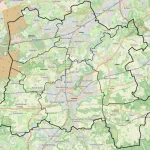Network Rail UK to Wholesale Out Upgraded Fibre Optic Network
A proposal by Ofcom for granting Code Powers (i.e. easier approval of street works etc.) to help Network Rail upgrade their Dark Fibre and mobile communications infrastructure has confirmed that the national railway operator will also provide “wholesale services to other telecom operators“.
Last year the Government’s Department for Transport said that it plans to make a new generation of “high speed” Mobile Broadband (3G and 4G) based Internet access services available to 70% of train commuters by 2019 (here), which could boost customer speeds up to 50Mbps (Megabits per second), and part of this will involve upgrading the fibre optic network that runs alongside their tracks.
Advertisement
At the time Network Rail said they expected telecoms and Internet traffic on their network to reach 200Gbps (Gigabits per second) by 2018, which can be catered for by the new Dark Fibre network that should be able to handle 192,000Gbps (take note that their network has to cope with a lot more than CCTV and Internet data). So it’s no surprise that Network Rail would seek Code Powers for building the new infrastructure and similarly it looks as if this will also be offered wholesale to other ISPs.
Ofcom Statement on NR Code Powers
The Applicant has confirmed that it intends that its electronic communications network and system of conduits will be used to improve mobile connectivity along the rail corridor and that it will offer wholesale services to other telecom operators.
It has explained that its planned network expansion would enable it to deliver and operate a high speed, high capacity national electronic fibre optical network infrastructure to transmit a variety of network and IP services to new geographic areas outside of its existing network footprint. Due to the coverage of the Applicant’s network, it has explained that this will serve to benefit the public as a whole as it is likely to increase competition in the provision of various broadband and telecom services in the future.
For these reasons, Ofcom considers that granting the Applicant Code powers would benefit the public.
In fairness none of this is especially surprising because it was always assumed that some wholesale access would be necessary, especially since major Mobile Network Operators (MNO) like O2, EE, Vodafone and Three UK are expected to help pay for at least some of the upgrades. Never the less it’s useful to have it confirmed and no doubt some fixed line ISPs will also have an interest in what they can offer, especially with railways passing through plenty of rural locations.
Meanwhile NR commuters were last year told to expect the first improvements in 2015.
Mark is a professional technology writer, IT consultant and computer engineer from Dorset (England), he also founded ISPreview in 1999 and enjoys analysing the latest telecoms and broadband developments. Find me on X (Twitter), Mastodon, Facebook, BlueSky, Threads.net and Linkedin.
« Telefonica UK Floats Tentative Prospect of an O2 Mobile Sale

















































Comments are closed